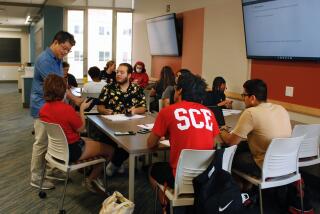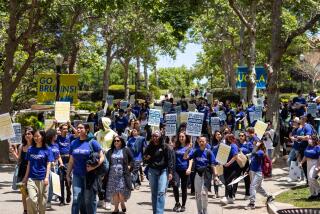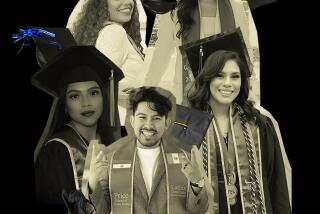Minds of the Future
- Share via
Meet the class of 2001, America’s first college graduating class of the new millennium, Chelsea Clinton’s class.
How radical or traditional are they? How altruistic and idealistic? Whom do they trust and distrust? Most admire?
To find out, Northwestern Mutual Life Insurance Co. recently commissioned Lou Harris & Associates to conduct telephone interviews with 2,001 racially and demographically diverse freshmen--53% women and 47% men--from 101 public and private four-year colleges. They found:
* Of those in charge of our political and social institutions, medical professionals get top marks, with 38% giving them an A. Almost one-fourth also give A’s to the military, the Supreme Court and major educational institutions. The White House and Congress get mostly Bs and Cs.
* 80% say they are likely to vote.
* Sleeping (44 hours) is how they spend most of their college week, followed by socializing (26 hours), class time (17 hours) and studying and homework (15 hours). Using a computer occupies 11 hours, dating seven hours, reading for pleasure only three hours.
* The people they most respect are their parents. The attributes they most admire are honesty/integrity (28%) and hard work/dedication (14%).
* Their major concern for the future? The educational system (mentioned by 68%), followed by crime/violence (65%), the environment (54%) and disease (53%).
* In choosing a career, their two most important considerations are idealistic and committed co-workers (67%) and the opportunity to help others (65%). While only one-third think earning big bucks is important, a starting salary of $38,000 is the hoped-for average.
* Nearly all (95%) intend to marry (at an average age of 26), and 91% hope to have children--three, to be exact. Divorce is acceptable to 61%. They acknowledge it will take two incomes to realize dreams of marriage, family and lifestyle.
* African American students are pessimistic about race relations (71%), while white students are split 50/50 on the issue.
* They believe the most important advantage of being in their generation is access to new technology, such as computers.
* Asked what special problems are unique to their generation, they list, in order, crime/violence, drugs, AIDS/HIV.
Other findings: They strongly value close family relationships. Owning a home is important. They value physical fitness and, in general, are satisfied with their looks. They do not believe that money buys happiness. The majority would fight for their country. Top career choices are medicine, teaching and business/marketing and most believe they will reach their goals. Most think it their duty to take care of elderly and infirm parents. And most would be interested in living aboard a space station or on another planet.
More to Read
Sign up for Essential California
The most important California stories and recommendations in your inbox every morning.
You may occasionally receive promotional content from the Los Angeles Times.













